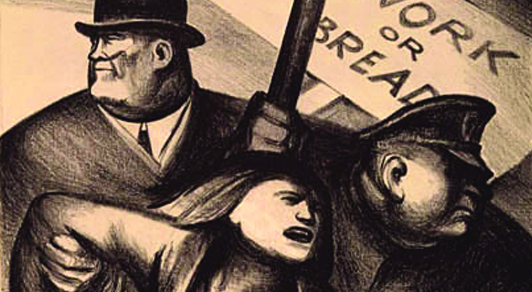
- This event has passed.
Capital, Volume 1, Part 2
Sat, February 20, 2021 @ 3:30 PM - 5:30 PM
$60 – $90
Capital, A Critique of Political Economy, Karl Marx
Volume I: The Process of Production of Capital
Second 12 Week Session Covering Chapter 4 thru Chapter 15
with Mary Boger
Volume I of Capital begins the scientific presentation of the laws of motion that underlie the developmental processes that has led to the realities of our contemporary human condition. In only 200-300 years capitalist relations of re/production have absorbed all pre-capitalist societies into its circulation of commodities making all that exists, whether real or imaginary, means for investing money to make more money. Private ownership and control over our earth’s natural resources by the owners of capital and separation of the world’s population from any direct access to our conditions of life and what we produce have reduced our human productive activity to a thing that is bought and sold at the bidding of capital.
Uncovering the how, what and for whom our life processes are determined based on the logic of using money in order to make more money is a journey we need to take if we are to consciously situate ourselves within our given historical process as effective political/social/universal actors. Marx’s scientific presentation of the laws of motion of capitalist development begins by analyzing the fundamental or elemental form which wealth takes in our society, the commodity. Understanding this form leads us to the most basic law that grounds social reproduction in societies under the domination of capital, the law of value. Therefore, in Session I, our first task was to break through the appearance and reveal the social content of the commodity form, the beginning of the unraveling of the why and how of what we necessarily, under the domination and exploitation of capital, experience every day in our lives.
Session 2 will complete the analysis of Part I: Commodities and Money, starting with Chapter 2: The Process of Exchange followed by the historical development of the money form in the circulation of commodities. This in turn leads to the Transformation of Money into Capital, positioning the reader to analyze the specific social relations of capitalist production (wage labor and owners of capital) in relation to the forces of production, the means of production. The analysis also enables us to understand the developmental processes that underlie the societal transformations that continuously occur as capital necessarily seeks to expand and accumulate more and more capital–increasing world populations as the employed part of the working class constantly grows while a relative surplus population thrown out of production grows even faster due to the ever increasing productivity of labor; along with constant introduction of new technologies–ever transforming our relation to nature, each other and the how, what for whom production takes place.
NEW STUDENTS: (Please Note) Part I of Volume I lays out the fundamental laws of capitalist development and its internal contradictions. It is necessary to fully understand all that follows as Marx explicates the dynamics particular to the historical process that we are engaged in reproducing in our everyday life, where the logic of re-production is based on money making more money. The First 12 Week Session covers Part I and has been recorded. It is available to be viewed through the MEP’s Vimeo. Upon registering, these sessions will be made available and I recommend listening to as much as possible, especially where Chapter 1 begins in in the fourth class.
Mary Boger, political economist (MA) sociologist (PhD), and ethnographic researcher. MA Thesis: Marx on the Fetishism of Commodities. Dissertation: A Ghetto State of Ghettos: Palestinians Under Israeli Citizenship. A member of the original founders of the first School for Marxist Education (1975) and its continuation as the New York Marxist School/Brecht Forum (1979-2014) and Mary is now engaged with the work of the MEP. She has been teaching Capital for many years to students of all ages and diverse occupations, backgrounds and countries of origin. Throughout these four and half decades. Mary has actively participated in movement struggles and solidarity work with a broad range of liberation struggles.
All classes and events are sliding scale. No one is denied admission for inability to pay. If you would like to participate but cannot afford the stated fees or any fee at all, please write to info@marxedproject.org for information on how to participate.
The photo above is from when many of the workers of Torino, Italy occupied their factories during 1919-1920.
